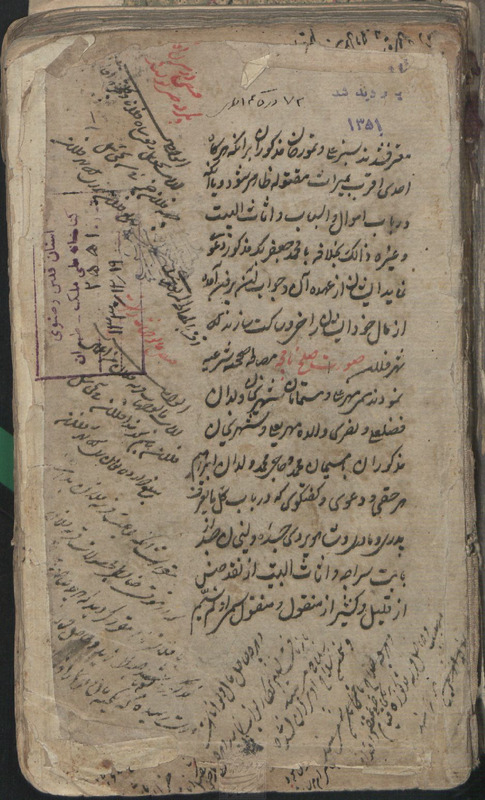Folio 1 recto
Go to Folio 1 Verso
متن:
معترف شدند سبزعلی و تمورخان مذکوران برآنکه هرگاه
احدی اقرب بمیراث مقتوله ظاهر شود و یا آنکه
در باب اموال و اسباب و اثاث البیت
و غیره ذالک بخلافه با محمد جعفر بک مذکور دعوی
نماید ایشان از عهده آن و جواب آن برون آمده
از مال خود ایشان راضی و ساکت سازند کتبا
شهر فلان صورت صلح نامجه مصالحه صحیحه شرعیه
نمودند مسمی مهرعلی و مستمامان شهریخان ولدان
فضلعلی و نصری والده مهریعلی و شهریخان
مذکوران با مسیمان محمد و حاجی محمد ولدان ابراهیم
هر حقی و دعوی و گفتگویی که در باب کل ما یعرف
پدری و مادری و شاهویردی جده ولیخان جد از
بابت سراچه و اثاث البیت از نقد جنس
از قلیل و کثیر از منقول و منقول سمی او لم نسیّم
حواشی:
الواجب
ازبابت تحویل رفعت پناه فلان و گلچره آقا …
جههّ فلان جز فی سنه کی [قوی] ئیل
مبلغ فلان تبریزی کتبا شهر فلان
اقر بالمصالحه المزبور عندی
قبض مالوجهات (مال و جهات) راست/رشت
الواجب
از بابت مالوجهات قریه فلان من اعمال
فلان باسم کدخدا فلان فی کی [قوی] ئیل
مبلغ دوازده تومان [تبر]یزی کتبا شهر فلان
مقرر است آنکه جماعت قریه فلان بدانستن؟
که از موقر/مفرق؟ ضابط محصولات قریه فلان
با فلان نام مقرر گردید که هرچه صاحب …
مذکور داشت/باشد ضبط نماید و حاصل جماعت/چنان؟
بدست رسیده که یکچند مال نو شمار افزون؟
و هر چه حاصل مال و دیوانی است
بازیافت شده درینکار ثواب نماید و هرچه
سلاح می بیند
و سخن سلاح او بیرون نشده
و هر چه صلاح با؟؟؟ می بیند
Main Text:
The aforementioned Sabz-Alī and Taymur Khān declared that whenever anyone appears who is closer [in the line of inheritance] to the inheritance of the [female] murder victim [maqtūla], or if [this person] raises a claim in disagreement with the aforementioned Muhammad Ja’far Beg regarding the property, possessions and household furniture etc., they [Sabz-Alī and Taymur Khān] will be responsible and able to manage it and respond to it and satisfy and appease [the claiming party] and calm [them] using their own property. In the month of so-and-so.
Sample of A Peace Agreement (sulh nāmcha): A correct and legal reconciliation [was achieved] between the named Mihr-Alī and named Shahrīkhan, sons of Fazl-Alī, and Nasrī mother of the aforementioned Mihr-ī-Alī and Shahrīkhan with the named Muhammad and Hajī Muhammad sons of Ibrahim. Any rights or claims or discussion regarding all that is known about the father and mother, and Shahupardī the grandmother, and Valī-Khān the grandfather, concerning the residence and household furniture, cash or goods, few and many, moveable and immovable, named or not named [continued the next folio]
Marginalia:
Financial Dues (al-wājib)
Issued as the remittance (tahvīl) for his highness (the elevation-sheltering) so-and-so to sir (agha)... for the purpose of such-and-such in the year of the ram (qūy), the amount of such-and-such Tabrīzī [currency] signed in the month of such-and-such. The aforementioned reconciliation was acknowledged by me. Receipt of the properties and possessions
Financial Dues (al-wājib) Issued from the properties and possessions of the such-and-such village which is [an establishment] set up by so-and-so in the name of such-and-such village elder [kad-khudā] in the year of the ram [qūy] the amount of twelve Tuman Tabrīzī signed? in the month of so-and-so.
It was established that the community at the so-and-so village on behalf of the protector of the proceeds of the so-and-so village, agreed that whatever the aforementioned owner took he will confiscate (zabt), and the proceeds from the inherited [properties], which include a number of new increasing properties, and all of the proceeds from the royal possessions, will be recovered and spent in this blessed [savab] act, and whatever he finds righteous [salah] [such that] it does not negate his interest and whatever he finds to be not righteous ???, he will engage in [collecting] the proceeds of the aforementioned village and collecting the receipts? from it.
